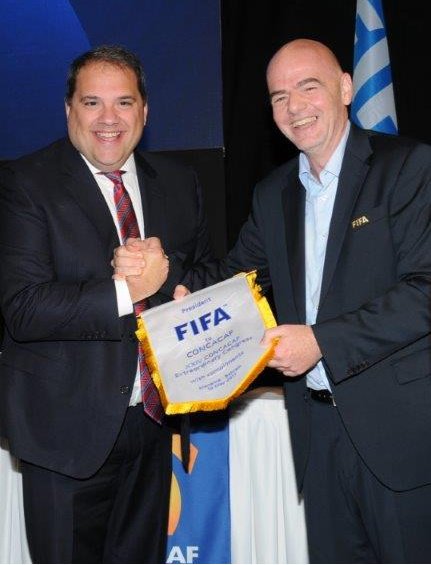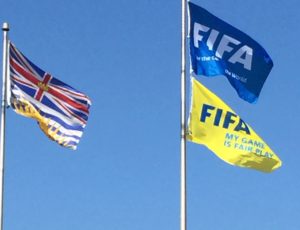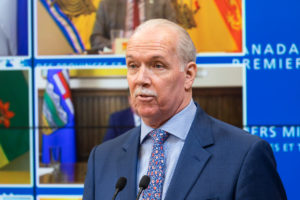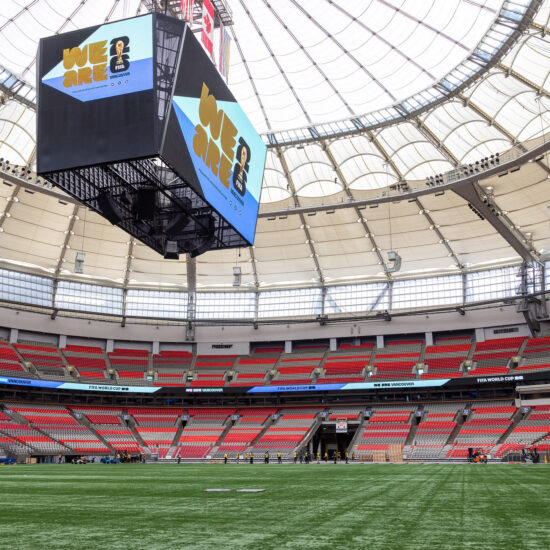
Bob Mackin
Costs for City of Vancouver to host the 2026 FIFA World Cup will be much higher than Mayor Kennedy Stewart’s proposed $5 million grant, based on cost estimates by the City of Toronto.

British Columbia and FIFA flags in 2015 outside the Westin Bayshore host hotel (Mackin)
A Toronto staff report to the March 30 executive council meeting estimates hosting five matches could cost $290 million. Organizers of the joint U.S.-Canada-Mexico tournament are expected to name the 16 host cities in May.
Toronto, Edmonton and Montreal were among 23 candidates in the winning 2018 bid. Vancouver was excluded after the B.C. NDP government couldn’t reach an agreement over extra costs to taxpayers at BC Place Stadium. When Montreal withdrew last July over rising costs, Premier John Horgan said his government had reopened talks with FIFA.
Toronto city officials estimate almost $94 million in direct costs to city taxpayers, so they are asking the Ontario and federal governments to cover two-thirds of the budget, or $177 million. They contemplate only $12.7 million revenue from FIFA.
In 2018, the City of Toronto estimated taxpayers would be only the hook for only $30 million to $45 million. Since then, the Canadian Soccer Association and FIFA have shifted more hosting requirements onto city hall, Exhibition Place, Destination Toronto and the owners of Toronto FC.
“This exercise – which considered the full breadth of the host city agreement – saw a rise in costs in several areas such as security, stadium adaptation and expansion, and preparation of training sites,” the report said. “City staff anticipate that there are areas where savings can be secured given that there is time available for lower cost alternatives to be identified and for FIFA requirements to be negotiated.”
Toronto has committed to providing FIFA with BMO Field, training sites, a 34-day FanFest and transportation and safety and security services. FIFA is also demanding an addendum to the 2018 agreement for upgrades and rental costs at BMO Field.
“Signing the contractual addendum has been identified by FIFA as mandatory to remain in contention for host city selection,” the report said.

Mayor Kennedy Stewart (Mackin)
It could take until the end of the year, however, for federal support to be announced because of the required national safety and security concept. Toronto already estimates the cost of police, fire and ambulance service will be $40 million.
Provincial and civic officials were asked to comment on the Toronto cost estimates. Vancouver city hall’s sport hosting manager, Michelle Collens, referred a query to the communications department, which declined to comment on costs. A statement from the Ministry of Tourism, Arts and Culture said it has “all the levels of government at the table discussing requirements and assessing costs.”
In return for spending $290 million, Toronto estimates a $307 million economic impact, with 3,300 jobs and 174,000 overnight visitors, resulting in $3.5 million municipal accommodation tax revenue. The report, however, did not include methodology.
Prof. Victor Matheson, a sports economist at the College of the Holy Cross in Worcester, Mass., is one of the world’s leading researchers of mega-events. He cautioned that boosters tend to overstate the benefits and downplay the costs, by relying on input-output modelling in order to attract or defend public subsidies. Matheson’s research has found large sporting events like World Cups and Olympics supplant, rather than supplement, the regular tourist economy.

Premier John Horgan (BC Gov)
FIFA, Matheson said, can afford to pay the full bill on its own. At the end of its last World Cup cycle in 2018, FIFA reported US$5.35 billion revenue from the Russia-hosted tournament contributed to its record US$6.42 billion, four-year haul. It called Russia 2018 “the most-profitable edition to date.”
At the end of 2020, FIFA boasted US$3.31 billion in assets and US$1.88 billion in reserves.
“There’s no reason that again, taxpayers in Vancouver or in Boston, where I am, should be subsidizing a private entity run by millionaires generating billions of dollars,” Matheson said.
Stewart said March 15 that he wants city council to commit $5 million. In 2015, city hall gave Women’s World Cup organizers $1.2 million for a fan festival at Larwill Park. The province granted FIFA $2 million, which amounted to free rent at B.C. Place Stadium.
FIFA’s hosting requirements for 2026 also demand governments provide it a tax holiday, exemptions from labour laws and permit the import and export of foreign currency.
The next World Cup kicks-off Nov. 21 in Qatar. Canada has qualified after a 36-year absence.
Support theBreaker.news for as low as $2 a month on Patreon. Find out how. Click here.











